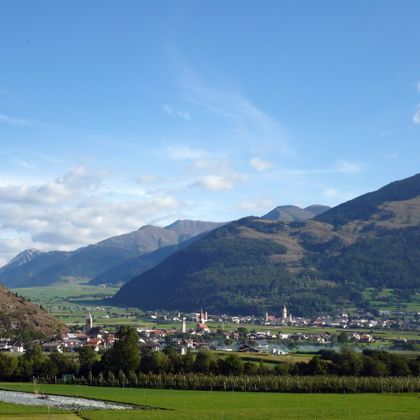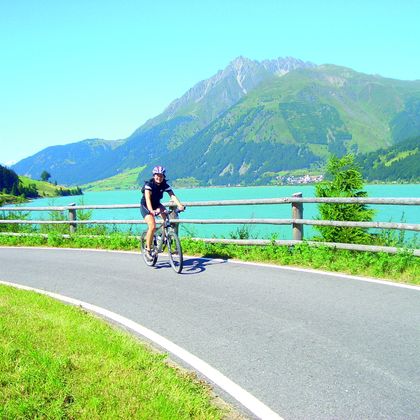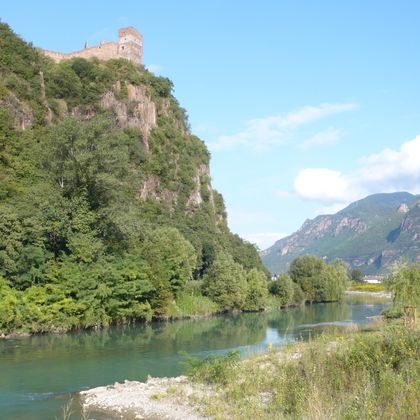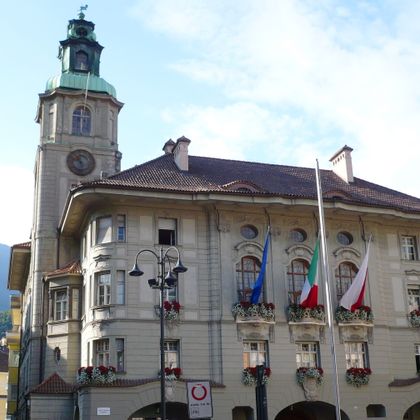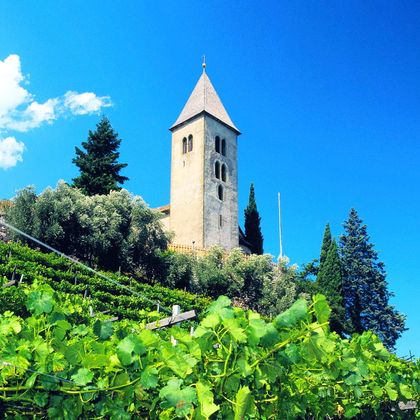Tour
Look forward to the small, lively border town of Reschen on Lake Reschen, which is idyllically located in the border triangle of Austria, Switzerland and Italy. To the northeast of Reschen, only a 20-minute walk away, the Adige spring rises at an altitude of 1525m. It meanders through the whole of South Tyrol before it grows into a large river and finally flows into the Adriatic Sea. With around 415 kilometers, the Adige is the second longest river in Italy! On your bike tour you will explore and discover part of the Adige. In the evening there is a personal tour briefing at the hotel and the bikes are handed out.
Your bike tour begins in an idyllic landscape, because you cycle directly along the beautiful Reschensee lake, from whose surface the famous church tower in Graun protrudes and encourages all cyclists to take a photo stop. Enjoy the Adige cycle path, because it always leads slightly downhill to Schlanders. Take a break in Glurns, the smallest town in Italy, which impresses with a completely preserved city wall, and stroll through the narrow streets of the town. You will reach Schlanders, the pulsating center of the Vinschgau, in a good mood. Strolling, shopping, tasting and enjoying should be on your program today.
Today the Adige cycle path leads you through the wonderful apple orchards of the Vinschgau. Passing castles and palaces such as Juval Castle which is owned by famous extreme mountaineer Reinhold Messner you roll comfortably with impressive views of the Ortler massif and the Stilfserjoch to Merano. Look forward to the beautiful Merano, whose city-center can be reached on low-traffic routes along the Passer River. Look forward to a glamorous town, to architectural diversity, arbor lanes for strolling and shopping, to Mediterranean promenades and green parks in front of an alpine backdrop.
Today you have a hard time deciding, because two route choices lead to Bolzano. You cycle either further along the Adige or more impressively through the orchards above Lana and Eppan. The Messner Mountain Museum Firmian is also located here in the well-renovated Sigmundskron ruins, which is definitely worth a visit. The circular course, designed in collaboration with Reinhold Messner, also includes the area around Sigmundskron Castle. The fortress that towers over Bolzano offers a fantastic view of the Texel Group and the Ötztal Alps. Whatever you decide, you can look forward to the South Tyrolean capital Bolzano. Stroll through the famous arcades, marvel at the imposing cathedral or simply enjoy a cappuccino on Piazza Walther.
You cycle past Messner Mountain Museum Firmian in the area of the South Tyrolean Wine Route past many castles, palaces and ruins to the wine village Eppan. Take a break and marvel at the impressive structure with battlements, walls, bay windows, double arched windows and open stairs. A visit to the well-known St. Michael-Eppan winery is also worthwhile, before you continue past countless vineyards and elegant country houses to Lake Kaltern, which impresses with its panoramic location. On the east bank of Lake Kaltern, you cycle via Klughammer with the famous Leuchtenburg back to the Adige and to Auer. Look forward to the small wine village with its historic mansions, narrow streets and courtyards, which exudes an enchanting charm.
The well-paved Adige cycle path brings you today in a brisk ride to Salurn, the largest white wine-growing region in South Tyrol. From here you will finally come to the Italian-speaking area of your bike tour. In Salurn, marvel at the imposing waterfall at the back of the village. Then you cycle comfortably to the center of the old council city of Trento, capital of Trentino. Let yourself be pampered here and visit the Castello del Buonconsiglio, the former seat of the prince-bishops and the cathedral square with the Cathedral of San Vigilio, consecrated in 1145. Marvel at the Palazzo Pretorio and the Neptune Fountain.
On the Adige cycle path you cycle through picturesque vineyards to Rovereto with its enchanting center and to the lonely town of Mori. A highlight awaits those with a sweet tooth. Try the well-known pistachio ice cream in the Gelateria Bologna, it is really a treat. Well strengthened, you cycle on a separately guided cycle path and master the small San Giovanni Pass (150 m). You will be rewarded with a wonderful view of Lake Garda, the largest lake in Italy. With pleasure you roll down towards your destination to Torbole and Riva.
A wonderful bike tour comes to an end this morning after breakfast. But Lake Garda tempts you to stay longer. We would be happy to book additional nights for you.
Map
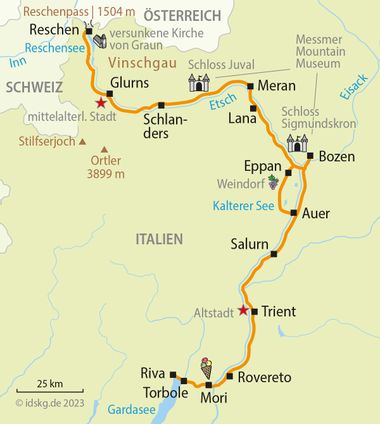
Prices / Dates
Services / Info
- Accommodation incl. breakfast in 3- and 4-star hotels
- Room with shower/bath/WC
- Luggage transport
- Personal tour information
- 1 pistachio ice cream or 1 fresh fruit juice on the way to Lake Garda
- Navigation app and GPS data available
- Digital route guidance via smartphone app
- Tips for tour preparation
- Touristic information
- 7 days hotline service
Below you will find specific information about the bike tour on the Adige Cycle Path from Lake Reschen to Lake Garda. If you have any further questions about this trip, just give us a call: Tel.: 0049 (0)6421 - 886890.
Arrival by train
Your destination station is Landeck (North Tyrol). From there you can take a public bus or taxi to Reschen via Nauders. Current timetable information and price information can be found very conveniently at:
Parking at the hotel
You can park your vehicle in a public car park in Reschen, this costs approx. €70.00 per week / vehicle. You will receive detailed information about the parking facilities at the hotel booked for you with the detailed travel documents two weeks before the start of the trip.
Condition of the bike paths
You cycle on wonderfully designed cycle paths, mostly along the Etsch, almost entirely on cycle paths or paved service roads. Only on very short stretches of road, especially near or in cities on busy roads. The route leads from the Reschenpass to Lake Garda almost 1,500 meters downhill, but there are still small inclines to be overcome
Available rental bikes
For this trip you can choose between 21-speed touring bikes with freewheel in different frame sizes as well as unisex electric bikes with back pedal. Simply let us know what bike you want when you make your booking.
Transfer back to the starting point
Every Saturday, Monday and Tuesday morning, there is the possibility to transfer back to Reschen with a minibus. The driver will come to your hotel and have space for you, your luggage and your private bike (if you have booked a rental bike, just leave it at the hotel). He drives you back to your starting hotel and thus ensures a perfect return journey service without the hassle of changing trains. Reservation and payment via Velociped is required in advance.
Extra costs that are not included in the tour price
Any tourist tax and charging fees for bicycle batteries are not included in the tour price and must therefore be paid at the hotel.
7 days hotline service
If the bicycle chain has broken, floods make it impossible to continue your journey or other nasty surprises await you: We are available for you 7 days a week and will organize help as soon as possible.
Passport and visa requirements
For EU citizens, there are no special passport or visa requirements and no health formalities to be considered for this trip.
Travel insurance
The tour price already includes the statutory insolvency insurance. In addition, we recommend that you take out travel cancellation insurance upon receipt of your travel confirmation in order to protect yourself against financial disadvantages in the event of travel cancellation, interruption of travel, illness or accident.
For this trip, we recommend using digital travel documents in the interest of sustainability. However, if you prefer, you can choose printed travel documents with a cycling map during the booking process.
Please note that price differences may apply depending on your selection.
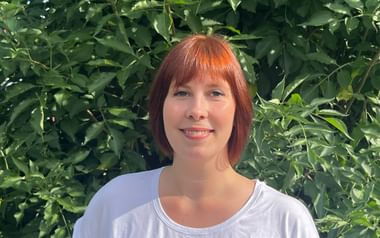
I provide you with advice and assistance
Nicole Henke
